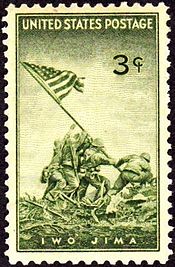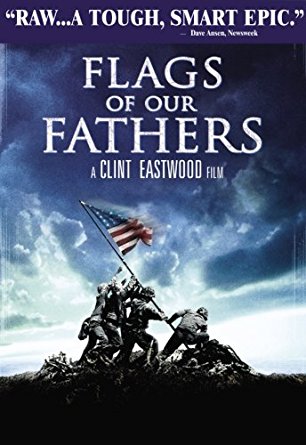Understated Eastwood (anti)war movie
Ryan Phillippe …. John “Doc” Bradley
Jesse Bradford …. Rene Gagnon
Adam Beach …. Ira Hayes
John Benjamin Hickey …. Keyes Beech
John Slattery …. Bud Gerber
Barry Pepper …. Mike Strank
Jamie Bell …. Ralph “Iggy” Ignatowski
Paul Walker …. Hank Hansen
Robert Patrick …. Colonel Chandler Johnson
Clint Eastwood’s Flags of Our Fathers is a touching rendition of the lives of three men who raised the flag that became “the single [camera] shot that can end the war” in the early days of the Battle of Iwo Jima on February 23, 1945.
Three of the six men who raised that flag, then survived the battle, were extracted from the campaign to become spokesmen for the government’s successful War Bonds’ appeals. They were paraded around the country as bona fide war heroes, to their embarrassment (and in the case of American Indian Ira Hayes, into a downward spiral of alcoholic self-destruction).
This is magic cinema, whether you like the war authenticity—the movie is coproduced by Eastwood and Steven Spielberg (Saving Private Ryan)—or the reminiscent romantic touches of Bridges of Madison County. Depicting such reality of battle has the effect of a hundred antiwar marches. And Eastwood, whose companion movie is Letters from Iwo Jima, has indicated in interviews he regards the movies as gritty testaments to the evil of war.
 The flag-raising photo became an instant classic, winning a Pulitzer, and becoming the most reproduced photograph in history. Less known is that the celebrated photo was actually a second (replacement) flag-raising on the same day in the same spot. The first flag raising was the direct result of Marines having taken the fortified Mt. Suribachi, and neutralized the heavy guns that had inflicted so many US casualties during the landing.
The flag-raising photo became an instant classic, winning a Pulitzer, and becoming the most reproduced photograph in history. Less known is that the celebrated photo was actually a second (replacement) flag-raising on the same day in the same spot. The first flag raising was the direct result of Marines having taken the fortified Mt. Suribachi, and neutralized the heavy guns that had inflicted so many US casualties during the landing.
The plot basically focuses on the three men of the second flag-raising that captured the American imagination. In current time, the son of “war hero” John “Doc” Bradley (Ryan Phillipe) has come to the hospital after Doc has had a heart attack. He is trying to connect the dots of what happened back then, also interviewing others who went through the times with his father.
The son, James Bradley, is the author of the book on which the movie is based. His inquiries provide the impetus for the stories of the men, their remembrances of carnage, fame, and then being discarded by the war machine… like so many veterans.
Ryan Phillipe, as Doc, plays the quiet, steadying spirit of the era—the quintessential average GI who does his citizen’s duty irrespective of the political machinations of the Oligarchy. He’s very good in the role, but Adam Beach gives the performance of a career as Ira Hayes, giving director Eastwood an efficient tool for demonstrating the depressing political absurdities, and racism, of the times.
If you have a father who fought in WWII, as I do—Captain Truman Wright, USAF, RIP—you will probably be moved to tears by some scenes. Particularly, the thematic climax, accompanied by Eastwood’s slow, quiet, haunting score of piano and bugle, where Doc on his deathbed disclaims any heroism. Nobody talks about the war because it’s too damned horrifying to remember.
“We just tried to keep ourselves alive, help keep our buddies alive, and come home. That’s it.” A poignant epitaph for the most humane, if not heroic, of the Greatest Generation.
This post has been read 1576 times!


